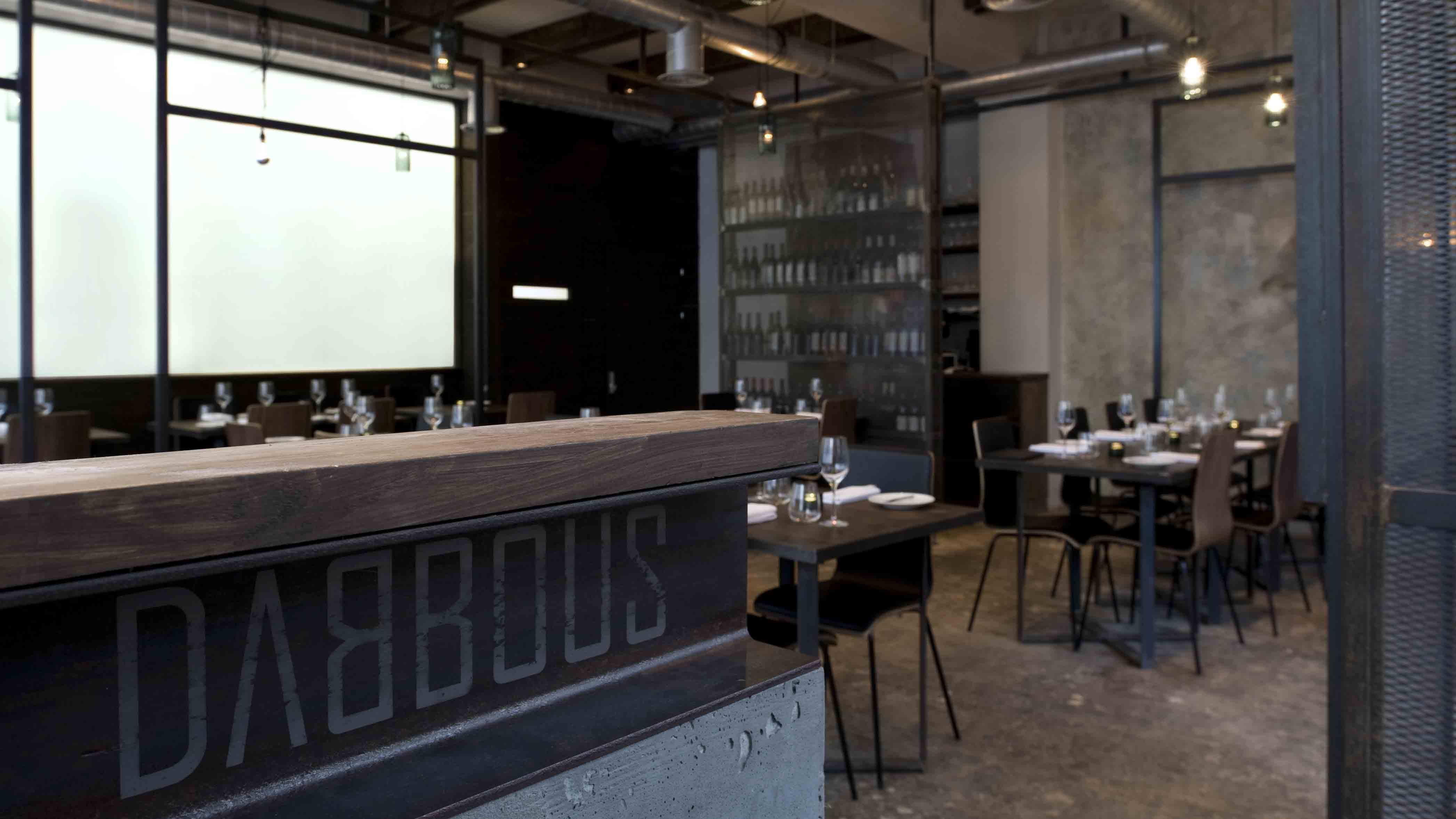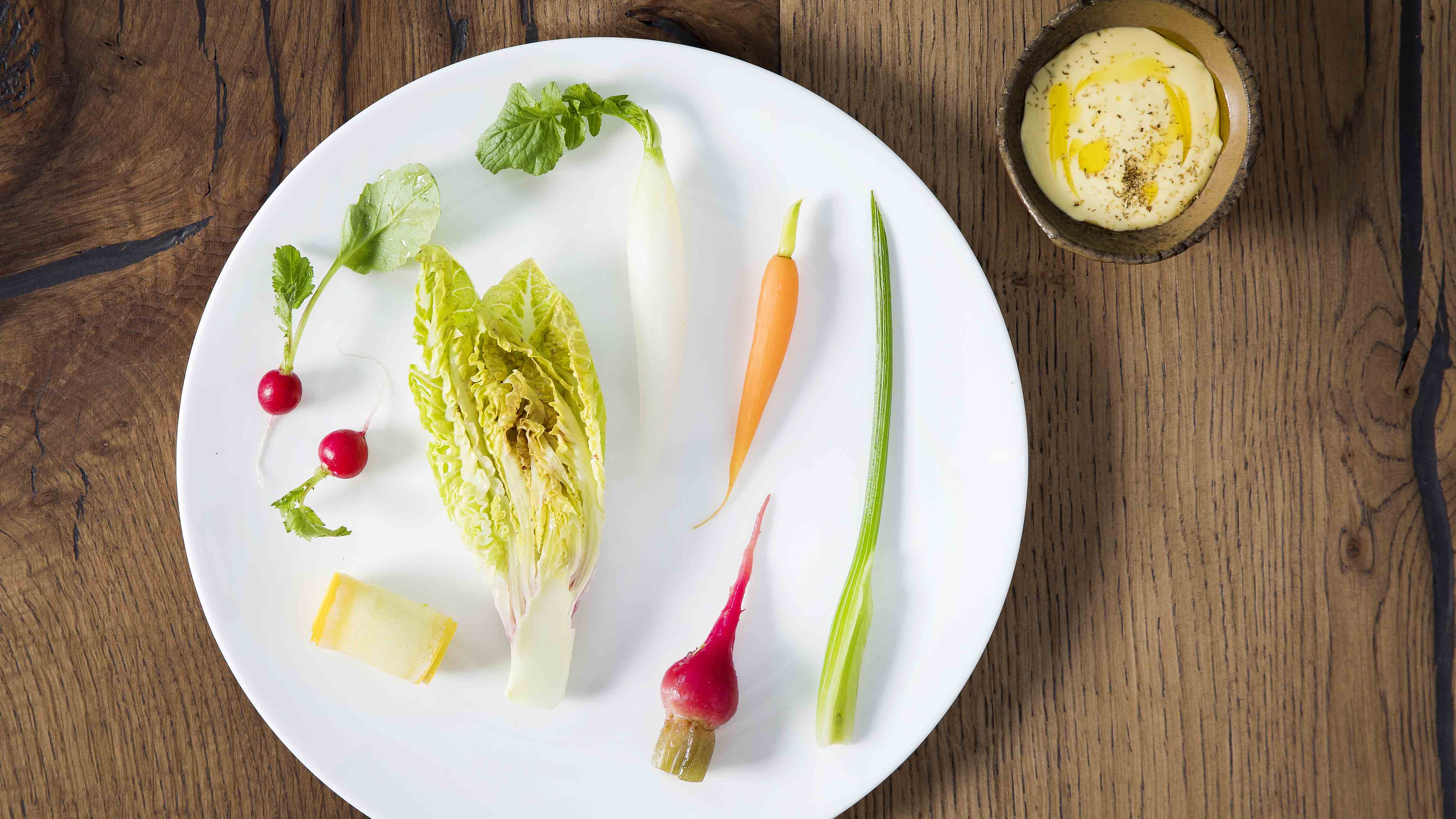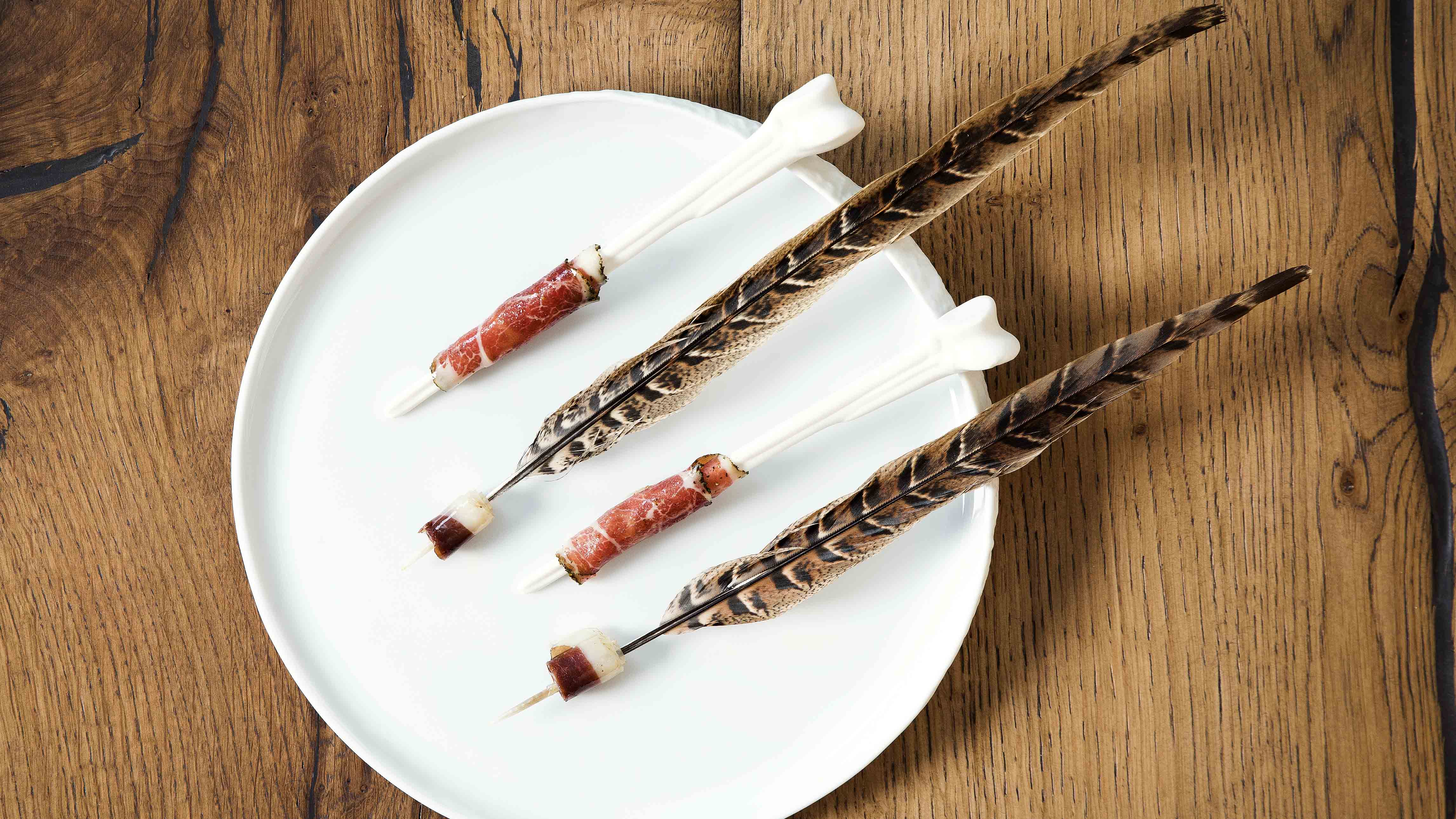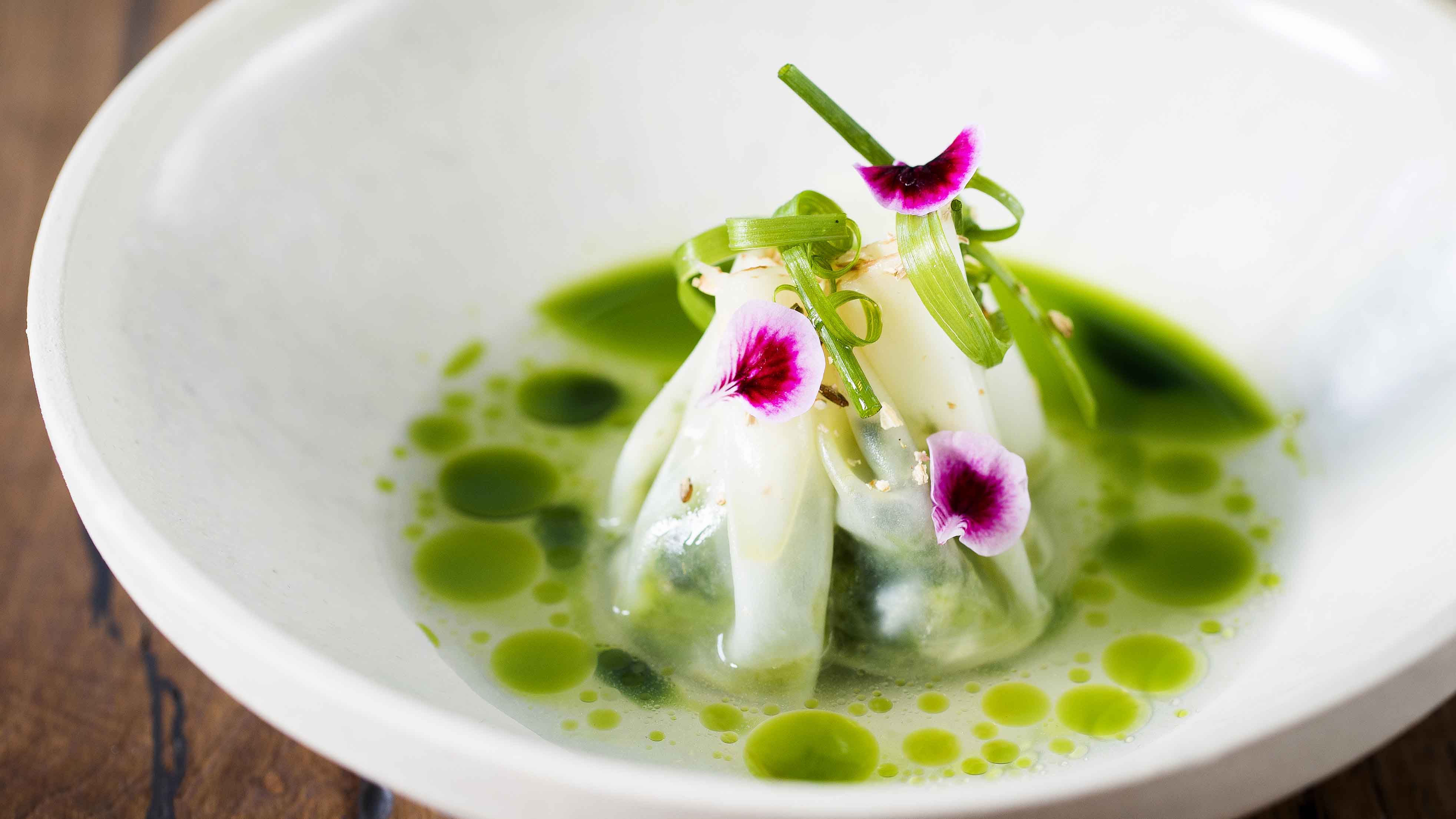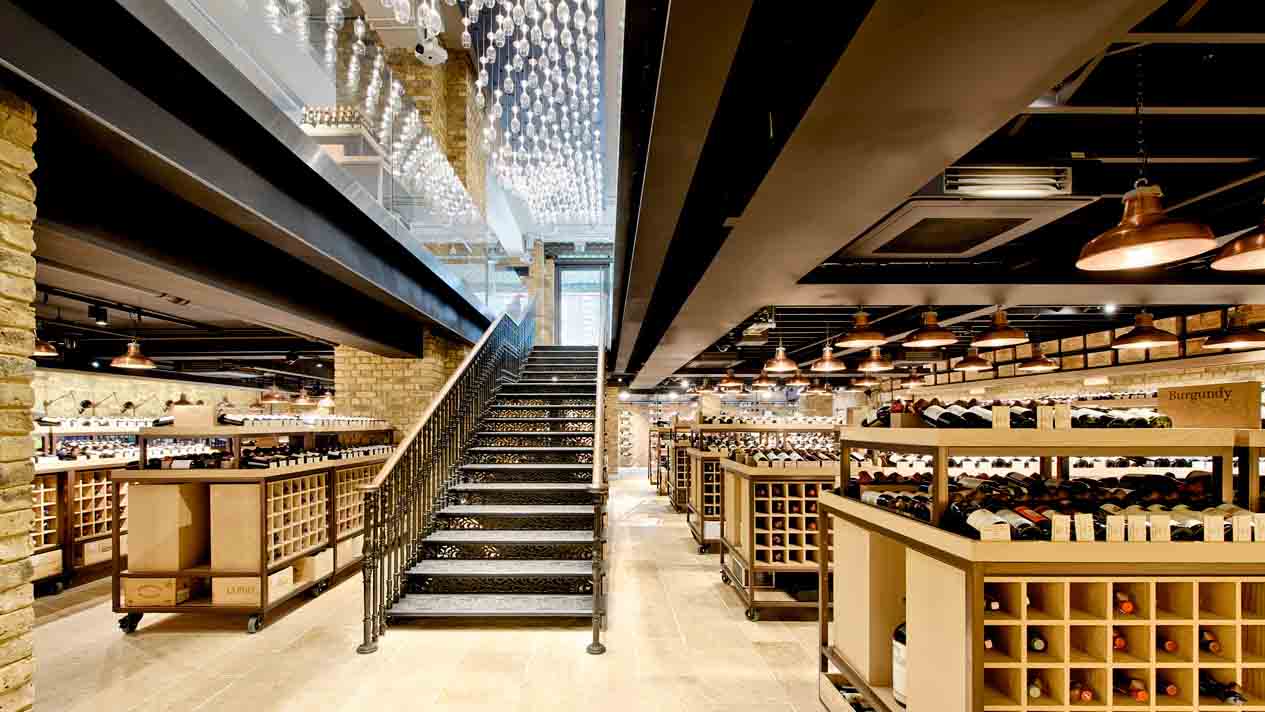Ollie Dabbous, Yevgeny Chichvarkin and Tatiana Fokina on Hide
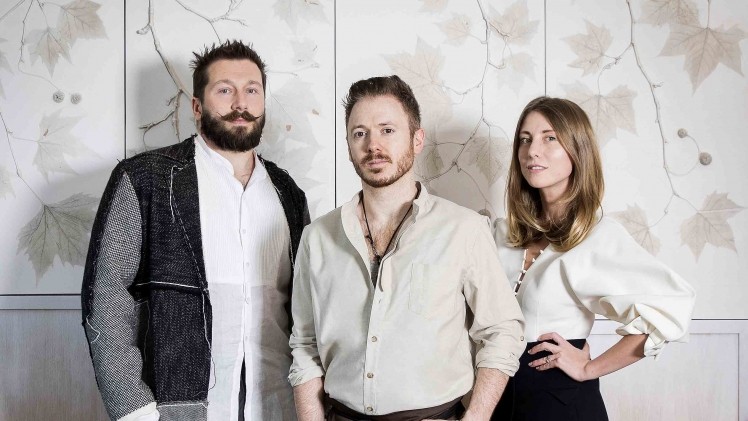
Ollie Dabbous’ new restaurant can be accessed via a car lift that will allow a select few to dine incognito thanks to a strategically positioned PDR and restroom. As he shows me round, the oligarch behind this upcoming Mayfair restaurant uses the example of a lunch meeting between Trump and Putin. I laugh and hope he’s joking, but I’m not so sure.
Offering sweeping views of Green Park, Hide is set to be the biggest restaurant launch of 2018 in terms of profile, investment and probably size too. The huge three-storey building is, in fact, three venues in one – two restaurants and a bar.
It’s owned by rich Russians. It will employ around 200 staff. It will offer the largest wine list in the country, the vast majority of which will be out of bounds to anyone who baulks at spending more than a couple of hundred quid on a bottle.
It is oxymoronic. Few restaurants want to be seen more than this one and Hide is also the sort of venue people will want to be seen in.
To restaurant goers of normal means, this will all be dispiriting news. Hide is a place to roar into in a Ferrari, or perhaps a souped-up Range Rover with blacked-out windows, yet another Mayfair restaurant that’s aimed solely at those lucky few that don’t need to bother looking at menu prices.
But there are reasons to hope that it won’t be a Sexy Fish on steroids. While aspects will appeal to the very rich – not least that ridiculous lift – the involvement of Ollie Dabbous should ensure that the project is at least partly grounded in reality.
The move to Mayfair
The 37-year-old chef is the first to admit that he is not an obvious choice for a blow-the-budget Mayfair restaurant. His eponymous Michelin-starred Charlotte Street debut, which closed last year (it is now Noizé), was a masterclass in stripped-back dining and was celebrated for its lack of chef-y frippery.
Nor is Mayfair the obvious choice for Dabbous. Rarely seen without his trademark deep v-neck white t-shirt and black leather jacket (an attire he even chose to wear while in the Arctic circle fishing for cod a few years back with Restaurant) he is more Soho than Savile Row.
When Dabbous and business partner Oskar Kinberg announced they were shuttering Fitzrovia to do a bigger project, few would have guessed that this would lead to the chef cooking at what is now one of the most prime sites in the most expensive part of the capital.
“We weren’t looking at Mayfair,” says Dabbous in his friendly and laconic manner. “But we’re looking forward to bringing something a bit more individual and progressive to the area. There are gems in this bit of town, but at some of the more glitzy restaurants there is a fair bit of overlap on menus.”
Dabbous’ cooking style – light, produce-led with a little new-Nordic influence, although not to the extent it feels derivative – is also not associated with the sort of ultra luxurious ingredients that are par for the course in Mayfair. That’s not to say the ingredients used at his former restaurant weren’t fantastic – they were – but for the most part Dabbous was more buttermilk and sorrel than lobster and foie gras.
“There are lots of places to eat premium ingredients round here. But very expensive does not mean better. We have a broad spectrum of ingredients on the menu, everything from pork neck to line-caught turbot and king crab,” says Dabbous, who does admit that Above – the most high reaching of the two restaurants he will oversee at Hide – will be using more top-end ingredients than Dabbous did.
Five years in the making
Another reason to be optimistic that Hide won’t only be of interest to the Mayfair elite is that its backers largely defy the caricature of the ultra-rich Russian investor.
Yevgeny Chichvarkin and Tatiana Fokina, are unfailingly polite and, while they have clearly thrown obscene amounts of cash at it, their inaugural UK venture, wine shop Hedonism Wines, located five or so minute’s away on Mayfair’s Davies Street, is as tasteful as it is impressive (see A hedonistic approach to wine).
Chichvarkin made his fortune in the mobile phone industry – he founded mobile phone shop Evroset (think Carphone Warehouse, but bigger) and was also involved in Vertu, which makes luxury phones studded with diamonds.
Currently in exile having fled Moscow in 2008, he is outspoken about corruption in his country of birth. He founded Hedonism with partner Fokina – who has a background in luxury retail – in 2012.
Eccentrically dressed in casual but clearly wildly expensive designer fashions, Chichvarkin certainly stands out (when we first meet he is wearing a large golden earring that depicts a bottle cap and safety pin). Fokina’s sartorial approach is rather more restrained by comparison, but no less expensive looking. The pair started looking for a restaurant a year after opening Hedonism.
“Part of the inspiration for Hide was that a lot of restaurants were sourcing hard-to-find vintages from Hedonism on the fly. We don’t mind that, but it did make us wonder why we were missing out on all the people who wanted to drink our wines in restaurants,” says Chichvarkin, who was in the running to acquire the site that’s now home to Sexy Fish, but was outbid by Richard Caring.
The pair got the keys for 85 Piccadilly in late 2013 (Dabbous came on board in 2016). The lengthy gestation period is partly down to major building works – the basement was dug out and the floors rearranged to create a space of suitable grandeur in an otherwise unremarkable modern building – but mainly tense and protracted negotiations with the building’s residents and Westminster Council, specifically its planning and licensing departments.
Once home to a brace of somewhat unremarkable restaurants (La Brasserie on the ground floor and Fakhreldine above), the building had been empty for some time prior to the deal. As a newly created lease, no premium was involved (quite a coup for a whacking great site in Mayfair) but the deal will have seen the pair commit to make a multi-million pound investment in the building.
Chichvarkin and Fokina did come close to flipping the lease for a tidy profit halfway through the process of getting the site open with Caring rumoured to be an interested party. In fact the building’s listing can still be viewed on a property website with the sales document detailing the pair’s structural changes as well as their hard-won licensing and planning consents. It has planning for 338 covers, but Hide won’t have anything like that number when it opens later this month.
“In London space is a luxury. I don’t believe you can have a luxury experience in a cramped venue,” says Fokina.
“We want people to feel very comfortable and at ease and be able to talk without being overheard.”
Closing a London icon
Despite its tight proportions and utilitarian look, the pair were regulars at Dabbous.
“We loved Ollie’s food there, but we felt the wine offering was not in step with the quality of the cooking. It’s understandable because a good cellar is a big investment,” says Chichvarkin, who worked a few kitchen shifts at Dabbous to get a sense of how top-end kitchens are run.
Dabbous and Kinberg made the decision to close Dabbous and their nearby consultancy Barnyard, a much more casual restaurant, in mid-2016.
“Dabbous was life-changing for me. I have no regrets at all. But equally the smaller the business the quicker you outgrow it,” says Dabbous, who is a partner in Hide as well as being a salaried member of staff.
"After five years of working long hours the walls started to creep in, he says.
“It felt smaller every day. I loved the view over Green Park at Hide and was excited about the extra resources. But the biggest draw was the space to grow. I want to create something with longevity where I can develop staff and my style of food. I didn’t feel I could do that at Dabbous.”
Opened in 2012, Dabbous generated an extraordinary amount of buzz, in fact it’s hard to think of a foodie restaurant that’s had more of an impact since. It was exceptionally well- reviewed and hopelessly oversubscribed – the difficulty in getting a table there in the early days is the stuff of London restaurant legend.
Like Dabbous, Hide will have a basement bar. Below will offer a selection of Hedonism’s rarest spirits, along with a cocktail menu penned by Kinberg. Moving up, the 75-odd cover restaurant Ground will be Hide’s more informal, all-day offer. The look is described as rustic yet refined, which may sound a bit contradictory, but is pretty much accurate. There is kitchen-style furniture, gnarly old pieces of timber, reclaimed iron doors and a magnificent spiral staircase that leads down to Below and up to the second of Hide’s restaurants, Above.
Given the dual nature of Hide, one might assume Ground to be a brasserie, but this isn’t the case. It will serve food of a comparable level to Dabbous only in an à la carte format.
With Dabbous considered to be one of the best places to eat in the capital when it was open, that’s quite a benchmark.
The menu kicks off with a selection of relatively affordable grazing dishes – including home-cured charcuterie; flatbreads; and a selection of raw and pickled seasonal vegetables – before graduating to rather pricier starters (£12-£24) and mains (save one £18 vegetable dish; £26-£32).
The dishes are broadly similar in style and price to those served at Henrietta, the Covent Garden restaurant Dabbous launched with Experimental Group in 2017 a few months before his eponymous restaurant closed.
Starters include Cornish mackerel tartare with iced eucalyptus; and toasted white and green asparagus with meadowsweet and warm hay buttermilk while mains take in salt marsh lamb cooked over embers with violet mustard, aubergine and smoked kelp; and poached Skrei cod with toasted buckwheat and black radish.
An all-day affair
Intriguingly for a restaurant of such ambition, Ground will also serve breakfast. Available from 7.30am on weekdays and 9am at the weekend, the menu includes the likes of pink grapefruit with prickly ash and black sugar; and homemade black pudding with mango chutney, crispy bacon and a fried egg. The team will also bake its own viennoiseries each morning, including birch sap croissants and banana bread with smoked maple butter. Ground will also serve a characteristically individualistic afternoon tea.
And so to Above, Hide’s high-reaching mezzanine restaurant. Upon climbing the spiral staircase it’s immediately evident that the L-shaped restaurant has a more upmarket feel than Ground. But it’s far from glitzy, with a rustic wooden floor, scandi-style chairs and hand- casted plaster panels set using the personal effects of Dabbous, Chichvarkin and Fokina.
It will be more ambitious and theatrical but won’t stray into fussy, chef-y or ostentatious territory. Launch dishes include roast king crab, turnips, camomile honey and salted butter; and slow roast goose with birch sap and kale.
The tasting menu – which offers choices on both the fish and the meat course – is priced at £95, although the headline price could be bumped by adding an extra savoury course (on the launch menu it’s ‘Cornish fish served in two services’). It’s not exactly cheap, but given the chef’s pedigree and the post code it is fair. Above will also offer a set lunch for a surprisingly egalitarian £42.
“We’ll be pushing the boat out, but it will be convivial and holistic. For example, instead of amuse-bouche we’ll be offering a selection of fresh seasonal vegetables, home-cured charcuterie and bread and broth,” says Dabbous.
“I lose patience with tastings menus myself. I never want it to feel like it’s a marathon or that I’m creating something to fuel my ego as a chef. I look at tasting menus as a means to deliver the best produce of the season in a simple manner. It’s not a vehicle to demonstrate technique.”
With a three-course à la carte meal at Ground considerably more expensive than the set lunch at Above and only marginally cheaper than the tasting menu, the pricing strategy is curious. Ground looks to be positioned as a more flexible, relaxed experience, but given the prices there only seems to be one choice for those that want to experience the very best of what Dabbous and Hide have to offer.
Great expectations
The plan is for Hide to win Michelin stars for each venue. Dabbous won’t be drawn on the number of stars he and his Russian backers want for Above, but one gets the sense it’s more than one. The scale of Hide is such that Dabbous will be reaching for recognition in a very different way.
Given the size of the operation he won’t be cooking anywhere near as much as he did at Dabbous. He is also planning to divide his time equally between the two restaurants rather than concentrate on Above, as some would have expected. It’s a lot to juggle and a lot of pressure too. Is he nervous?
“I’m self-critical but I’m not a worrier by disposition. It’s ambitious but I don’t feel pressure,” he says.
“I’m proud of all the recipes and I’m happy with the way that the staff have been trained. We have amazing people, amazing suppliers and an amazing kitchen. Rather than feeling nervous, I feel empowered.”
Each restaurant is headed by a former Dabbous chef, Luke Selby at Above and Josh Angus at Ground.
“They’re lovely, cultured, mild mannered chefs,” says Dabbous, whose CV includes Claude Bosi’s Hibiscus, a brief spell at Noma and a long stint at Belmond Le Manoir aux Quat’Saisons.
“Like that of Dabbous, the kitchen at Hide will not be a hotbed of passive aggression or hero syndrome. We will be determined, but we will also be organised and composed.”
A wine list like no other
Hide’s wine offer is also accordant with its Michelin aims, thanks to the heavyweight backing of Hedonism, but Dabbous’ Russian backers have attempted to make is as inclusive as possible.
It is not a place that’s only suitable for wine lovers with a big budget, nor is it a wine-led establishment. Rather, it is an ultra-luxurious venue that excels in all aspects of the restaurant experience, says Fokina.
“The main point of difference is not the high price of some of our wines but its breadth and depth. We have carefully selected great wines for those on a budget and many of our glasses of wine are under £10.”
There will be two wine lists. Customers who don’t want to deep dive will be presented with a 400 bin list of the wines held on site – some hard-to-find varieties but others that are more approachable. There is a large by-the-glass offering and Hide will also house the largest selection of half bottles in Europe.
Serious oenophiles that have come partly because of the Hedonism’s connection will be offered a tablet that lists all 6,685 bins from the shop. In consultation with the sommelier (if required), they will be able to order wine at the press of a button from the shop. It will also be possible to arrange for a wine to be aired at Hedonism prior to dining at Hide.
While the restaurant itself can’t claim to have the largest wine selection in the UK – that record is currently held by private members’ club 67 Pall Mall – in practice it will offer the biggest choice. Currently it’s taking about 14 minutes from the point of ordering to get bottles from Hedonism to Hide. The pair are looking into ways to speed this up – perhaps with some form of two-wheeled transport – but older wines with sediment are tricky because they need to be carried on foot “like a baby”.
Wines ordered from the shop are charged at their retail price plus £30 corkage. With fine wines in restaurants typically sold for at least double (often closer to triple) their retail price, this policy offers extraordinary value. At Gordon Ramsay’s Petrus in Knightsbridge a bottle of 1982 Petrus goes for £13,500. To drink the same bottle at Hide will cost £6,879.90.
While hugely attractive to customers, this approach severely limits Hide’s profitability: trousering the big margins achieved from selling expensive wine is often what keeps restaurants of Hide’s ilk afloat. Chichvarkin and Fokina acknowledge this to some extent, but believe a high volume of sales will make their wine offering profitable overall.
“Retail margins are low, but with the corkage we think it will work. We have a licence to sell wine from 10am to 12.40am,” says Chichvarkin. The fact that all of Hide’s wines will be sourced from Hedonism will also help, he says.
The director of wine is Piotr Pietras, formerly of D&D London’s Launceston Place. One of the youngest Master Sommeliers in the world, he will head a team of 16 sommeliers.
Seven-days-a-week operation
There is little doubt that the trio are looking to create one of London’s most prestigious restaurants, and at Ground they also look to be attempting to blur the lines between fine dining and a brasserie-style approach in terms of operation.
All three floors of Hide will be open seven days a week, but the hours won’t be quite as punishing as that might suggest. As with Dabbous, chefs will work on a four-days-on, three-days-off basis.
“We don’t want to be Dickensian,” insists Dabbous. “We’ve put a lot of effort into providing good working conditions. Basement kitchens can be horrid so we’ve worked on the light and the airflow.”
And the chefs are just there to cook. One of the advantages of a bigger operation is that it is more economically justifiable to segregate roles.
“We will have a team that comes and cleans the kitchen overnight. I want to produce great food but also great chefs. Le Manoir was a stable for talent and produced exceptional chefs. If Hide can produce a fraction of that in the years to come I’ll be happy.”
Back of house is beautifully spec’d too. Ground’s subterranean kitchen in particular is an incredible space with a separate area for breakfast service and bakery. It’s quite a contrast to the galley kitchen at Dabbous, a 3m by 9m space that – on Restaurant’s first visit, at least – contained little more than a stove, a combi-steamer and four knackered chefs.
Dabbous was about the team making the best of what they had, which wasn’t much. At Hide, Chichvarkin and Fokina have given Dabbous and his team everything they need to succeed. It will, therefore, be interesting to see what critics and the industry make of it all.
Some will inevitably accuse him of selling out and swapping an authentic business that grew organically for new, embarrassingly extravagant digs. Others will see the size and complexity of the operation as a barrier to greatness.
It is an unexpected move for Dabbous, but one that has afforded him access to resources that most chefs can only dream of. He looks happy with his decision and comfortable in his own skin. Hopefully he will be comfortable at Hide too.
This feature first appeared in the April issue of Restaurant magazine, the leading title for the UK’s restaurant industry. For more features, comment, interviews and in-depth analysis of the restaurant sector subscribe to Restaurant magazine here
A hedonistic approach to wine
Hedonism is a wine shop for people who don’t like to be told ‘no’. In fact, the idea for it arose following a fruitless search for a rare rioja by co-founder Yevgeny Chichvarkin. Opened in 2012, it is now one of the world’s most famous wine retailers and has – for some at least – become emblematic of the takeover of Mayfair by rich foreigners that has occurred over the past few decades.
Among its groaning shelves you’ll ind the biggest and most valuable range of wine and spirits of any retailer in the world with around 10,500 bottles. Its most expensive single bottle of wine is a 2004 Penfolds Block 42 at £120,000 (the price covers the handmade wooden cabinet in which it is housed and – by prior arrangement – Penfold’s head winemaker will come over from Australia to oversee its opening and pouring).
Hot on its heels is an 1847 Château d’Yquem at £96,400. Hedonism’s reputation and scale alongside the skill of its buying team gives it access to hard-to-find wines and can in some cases lower prices. “We look for wines that are so hard to ind most people don’t even bother,” says Chichvarkin. “We have the resources and connections to source the most exclusive wines in the word. We hold regular tastings with famed winemakers, who see Hedonism as a great shop window for their products.”
